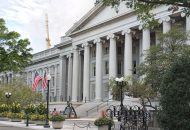Ginsburg Laments Increasingly Partisan Nature of Judicial Confirmations

WASHINGTON – In the latest of a series of public appearances since her recent bout with cancer, U.S. Supreme Court Justice Ruth Bader Ginsburg lamented the increasingly partisan nature of judicial confirmations.
“Things have changed, and it shows up on both sides of the aisle,” Ginsburg told a crowd at the University of Chicago Monday.
“I don’t know what it will take, but we really should get back to the way it was when people were examining the qualifications for someone to be a judge rather than try to guess how they would vote on contentious cases,” she said.
Ginsburg pointed to the confirmations of Chief Justice John Roberts and Justices Sonia Sotomayor and Elena Kagan as examples of the changing times.
Roberts, who was nominated to serve on the high court by President George W. Bush, was confirmed by a 78-22 vote in 2005.
While he was unanimously supported by Republicans, receiving 55 votes from GOP lawmakers, he also received 22 votes from Democrats and one vote from an Independent. Twenty-two Democrats voted no.
The Senate confirmed Sonia Sotomayor to be an associate justice of the Supreme Court on August 6, 2009, by a vote of 68–31.
The Senate was composed of 58 Democrats, 2 independents who caucused with the Democrats, and 40 Republicans at the time. Thirty-one Republicans voted against her.
Justice Elena Kagan’s nomination was confirmed by a 63–37 vote in the Senate on August 5, 2010. The make-up of the Senate was the same as when Sotomayor was nominated, only this time, 36 Republicans voted against Kagan.
Ginsburg herself was confirmed in 1993, by a 96-3 vote in the Senate.
Though she did not mention them, the partisan divide on Supreme Court nominees has grown even more pronounced since the election of President Donald Trump.
His first Supreme Court nominee, Neil Gorsuch, was confirmed by a 54–45 vote in the Senate on April 7, 2017, with all Republicans and three Democrats voting in his favor.
On Oct. 6, 2018, the Senate voted 50-48 — on a Saturday — to confirm Justice Brett Kavanaugh, with all 49 Republicans voting yes and 48 Democrats voting no. Sen. Joe Manchin of West Virginia was the lone Democrat to cross party lines and vote in favor of the nominee.
The justice appeared at the University of Chicago to receive the 2019 Harris Dean’s Award—given annually to an exceptional leader who has championed analytically rigorous, evidence-based approaches to policy, and who is an example for the next generation of policy leaders and scholars.
During her visit to the campus, she appeared onstage with Katherine Baicker, dean of the Harris School of Public Policy, before about 400 people.
Ginsburg was treated for pancreatic cancer in August. She has had several health setbacks over the years, including an additional three cases of cancer. Ginsburg also fell in her office in 2018 and fractured three ribs.























